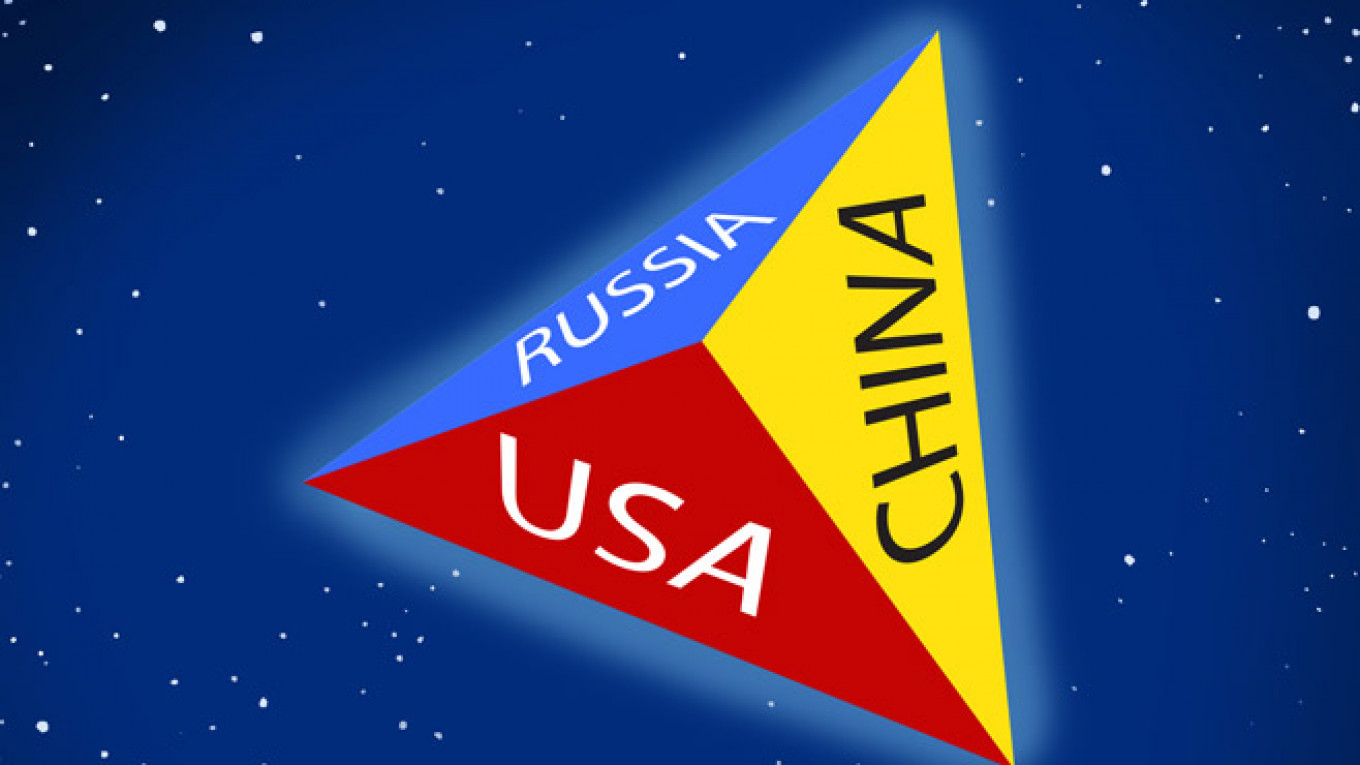U.S. President Barack Obama has talked a great deal about a pivot to Asia, but recent news make it look on the surface as if it is Russian President Vladimir Putin who is actually delivering.
Not only is his Chinese counterpart Xi Jinping going to be in Moscow attending the May 9 Victory Day parade that his Western counterparts are so conspicuously snubbing, but every day seems to bring reports of new Russo-Chinese initiatives.
This month, six Russian and three Chinese warships will carry out live-fire training in the Mediterranean. Exercise Joint Sea 2015 will be the very first time they have operated together in the Mediterranean (they have been mounting joint exercises in the Pacific and Asian seas since 2012).
This is essentially a political gesture, but as such it is effective, especially combined with the slew of recent announcements of defense sales and joint projects. China is to become the first foreign buyer of the advanced S-400 surface-to-air missile system, for example, and the two countries are to cooperate on upgrading the Russian Mi-26 heavy military transport helicopter design.
There is even talk of Moscow having a role in Beijing's ambitious $40 billion planned moon base, as well as license-production of Russian space rockets to support the program.
Meanwhile, Beijing is offering to invest $5.2 billion in a high-speed rail line. The line would connect Moscow and Kazan and in due course be extended to China.
All exciting stuff, although largely to be considered as secondary to the massive flow of Russian primary exports to China. At the end of April, the Federation Council ratified the deal, signed last year, to deliver 38 billion cubic meters of natural gas to China from 2018 through the Power of Siberia pipeline. The deal is worth some $400 billion over 30 years.
Overall, in 2014, bilateral trade was worth $95.3 billion and the intention is to raise this to $100 billion as part of a plan to reach $200 billion by 2020.
In this context, perhaps it is unsurprising that a survey carried out by independent pollster the Levada Center in January found that while 81 percent of respondents regarded the United States negatively, a record-breaking 80 percent expressed positive views of China.
Meanwhile, in last year's Pew Global Attitudes Survey, 66 percent of Chinese respondents said they had a favorable view of Russia. Then again, 50 percent were favorable to the USA.
Besides, this is a distinctly — and increasingly — asymmetric relationship. Moscow needs Beijing at the moment far, far more than the other way round. The Chinese have learnt the value of not sounding triumphalist, but they are hardly unaware of the power relationship at work.
They bargained harshly over the gas deal, for example, knowing that Putin desperately needed it, and as a result were able to get a very good price.
Overall, Beijing is not especially interested in economic opportunities in Russia beyond those areas of direct value to its domestic economy. These are energy, other extractive industries, and the infrastructure that can help get them out of Russia and into China, but also help get Chinese goods into the markets that truly interest them, in Europe, the Middle East and even Africa.
In so many ways, Beijing is not Moscow's friend so much as its loanshark. It is eager to take advantage of its present troubles to buy whatever equity catches its eye at a good price rather than to do its neighbor any favors.
Besides which, China's connections and cooperation with Russia are just part of a multifaceted new active engagement and even assertiveness in the world. The Chinese navy is not only looking to the Mediterranean, for example. Since 2009 it has been carrying out anti-piracy patrols off Somalia, and last year it began joint training operations with the Iranian navy.
More generally, while China may complain at Washington's "hegemony," trade with the U.S. is worth more than five times that with Russia. In 2014, it invested $12 billion in the U.S., half as much again as in Russia.
So, while Xi Jinping's presence in Moscow is undoubtedly a comfort to a president feeling the sting of being snubbed by other international leaders, Putin should beware believing too much of Moscow's own hype.
Dmitry Trenin of the Moscow Carnegie Center recently wrote that "In lieu of a Greater Europe from Lisbon to Vladivostok, a Greater Asia from Shanghai to St. Petersburg is in the making." He may well be right.
However, any thought that this will be a Greater Asia dominated by Moscow and its agenda is likely to be disappointed. China has time and money on its side. Putin may discover a pivot to Asia can easily become a spiral.
Mark Galeotti is professor of global affairs at New York University.
A Message from The Moscow Times:
Dear readers,
We are facing unprecedented challenges. Russia's Prosecutor General's Office has designated The Moscow Times as an "undesirable" organization, criminalizing our work and putting our staff at risk of prosecution. This follows our earlier unjust labeling as a "foreign agent."
These actions are direct attempts to silence independent journalism in Russia. The authorities claim our work "discredits the decisions of the Russian leadership." We see things differently: we strive to provide accurate, unbiased reporting on Russia.
We, the journalists of The Moscow Times, refuse to be silenced. But to continue our work, we need your help.
Your support, no matter how small, makes a world of difference. If you can, please support us monthly starting from just $2. It's quick to set up, and every contribution makes a significant impact.
By supporting The Moscow Times, you're defending open, independent journalism in the face of repression. Thank you for standing with us.
Remind me later.


